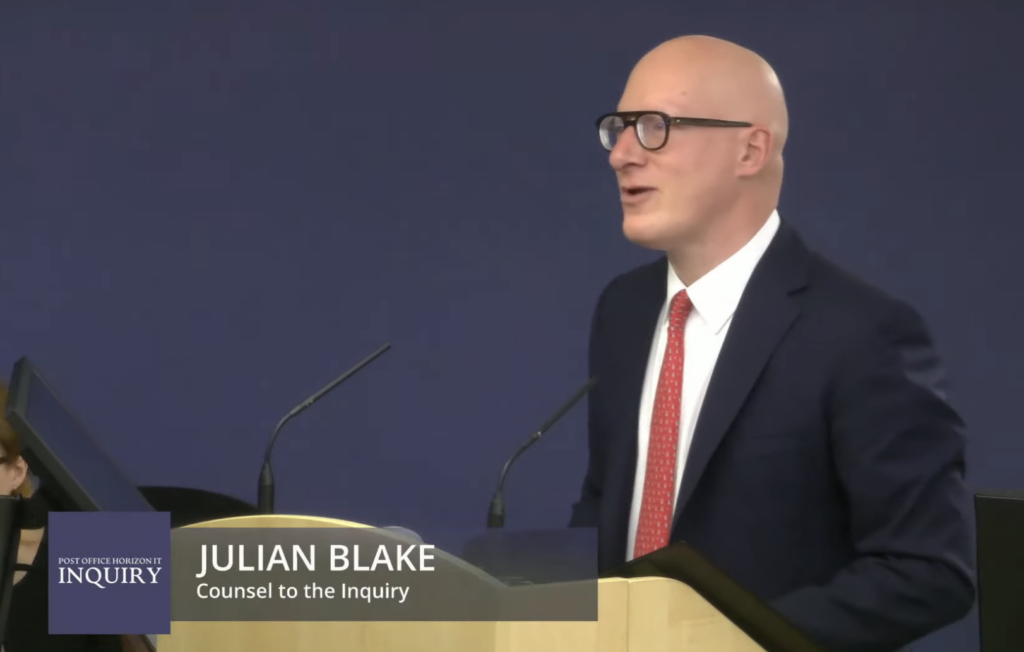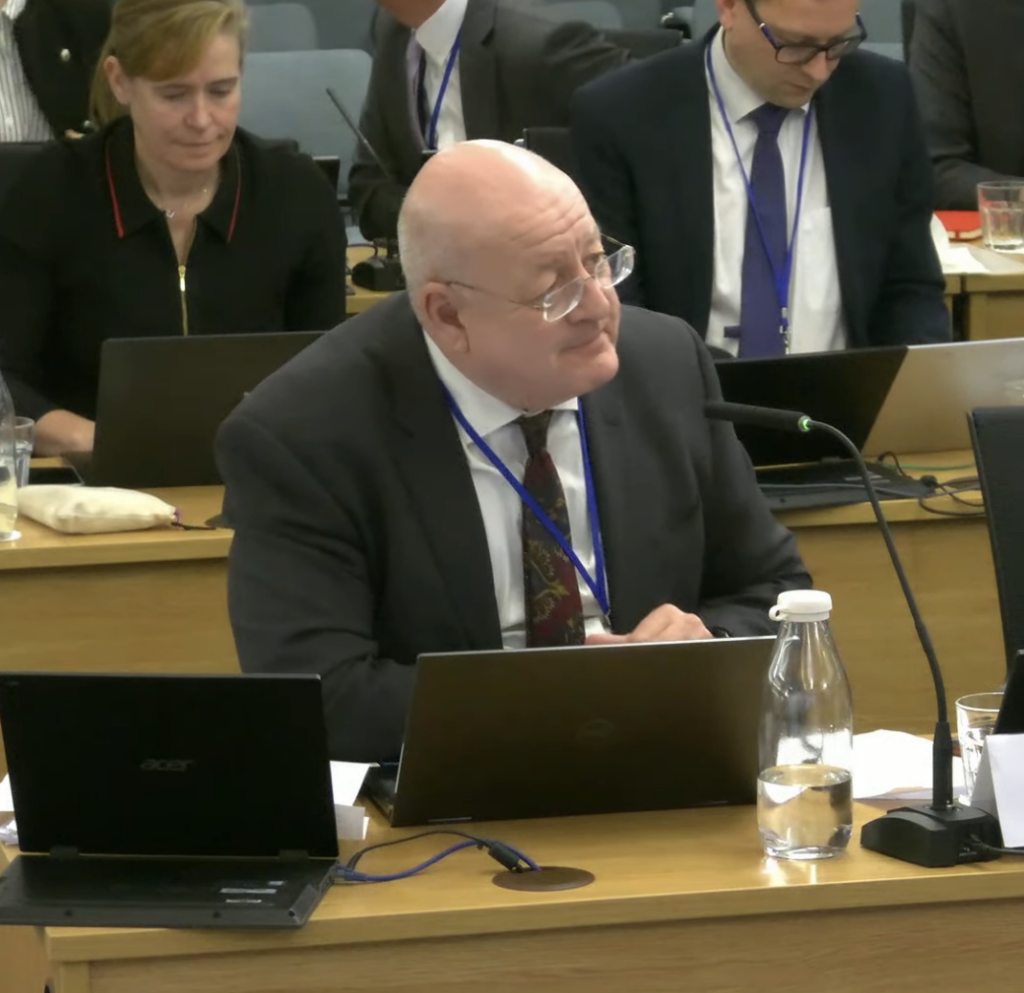
What a difference a bit of time off makes. The last time Ben Foat was questioned by the Inquiry, he looked like a rabbit in the headlights, nervously surveying the mess he’d made of the Post Office’s disclosure responsibilities.
Today Foat gave evidence from a remote location, having declined to turn up in person, due to his ill-health. He also dictated the format of the Inquiry’s questioning, requiring a fifteen minute break after each hour of evidence.
Foat was calm, composed, helpful and clearly had enough time to look at the documents presented to him by the Inquiry to build a bullet-proof position against taking responsibility for any aspect of the Post Office scandal.
Foat joined the Post Office as Head of Legal in financial services in 2015, became Legal Director in 2016, won the Law Society’s in-house solicitor of the year award in 2018 and became Post Office general counsel in 2019, where he stayed until he became “increasingly sidelined” by his superiors within the business in early 2023.
Big Ben reminded the Inquiry that whilst he knew taking on the role of General Counsel within the Post Office would be “challenging” he was the right man for the job.
“I have had the benefit of having excellent previous experience,” he purred modestly, “whether it’s as a senior associate in private practice, or… teaching law at university or publishing, as well as working in an in-house role as a corporate lawyer for a major financial services institution.”
And… “I have also been on subsidiary executive committees and also risk and compliance committees and so I’ve had the benefit of extensive experience.”
Earlier this week, John Hyde at the Law Society Gazette listed five questions Foat had to answer. They were:
1) Do lawyers still believe most sub-postmasters were guilty?
2) Is the compensation process too confrontational?
3) Have lawyers put up unmanageable hurdles for claimants?
4) Are people still being prosecuted based on Horizon data?
5) Is the role of Post Office GC an impossible job?
The closest we got to a straight answer to any of the above was when counsel to the Inquiry, Julian Blake asked about compensation.

Foat confirmed that Herbert Smith Freehills (HSF) designed the hated Horizon Shortfall Scheme (HSS)and just about conceded it was very difficult to navigate for claimants. Or in his words:
“Obviously, Post Office is not a claims management company and it sought advice from HSF as to the establishment of the scheme. I am mindful of also… inquiry’s previous consideration in respect of the issue and I accept, of course, I think with the benefit of hindsight being able to make things clearer, being able to put things in more plain English, I think are entirely fair observations.”
Here are five other things we did learn from Foat’s evidence:
1 – Foat was told Horizon was robust as an air traffic control system.
When Foat arrived at the Post Office in 2015, just after “the Panorama episode had aired”, his colleagues told him the Horizon IT system was as robust as an “air traffic control system”. When asked who told him this, Foat replied: “that was the statement that I heard on a number of occasions from people. I don’t recall specifically the individual who said it, but it was a phrase that was used.”
2 – The Post Office CFO was keen to re-start prosecuting Subpostmasters
In June 2017, the Post Office CFO Al Cameron told colleagues that the unwillingness to prosecute Subpostmasters was “costing us blood”. Cameron proposed finding and prosecuting a “not too sympathetic a postmaster” who had made an “admission” but who wasn’t part of the group litigation.
3 – One of the worst Post Office lawyers, Rodric Williams, “tried to do his best“
Although Rodric Williams was Foat’s direct report, he took no responsibility for Williams’ actions in past criminal actions or the group litigation, and was quite happy for Williams to work with the Post Office GC Jane MacLeod (who has refused to give evidence to the Inquiry). A document seen by Williams which cast doubt on previous prosecutions was not shared with Foat. Foat called Williams “a very diligent and passionate lawyer”. Blake asked Foat what he thought of him now. Foat acknowledged the “devastation” Williams had abetted, but added his “genuine observation” of working with Williams “is that he is a person of integrity and he’s tried to do his best in the circumstances.”
4 – Foat contradicted Post Office CEO Nick Read twice
On the first occasion, Blake wanted to know about a specific aspect of the Bates v Post Office settlement negotiations, asking “Were you aware that a substantial proportion of any settlement would go to pay the costs and litigation funders on the part of the claimants?”, to which Foat replied “Correct, yes.” In April 2021, Nick Read told staff “it has only become apparent through various news reports since quite how much of the total appears to have been apportioned to the claimants’ lawyers and funders.” Read was part of the settlement negotiations team.
On the second occasion it was to “categorically deny” that he told Read when Read joined the business that he should not “dig into the past” and should consider the past prosecutions of Subpostasters an “historic issue”. Foat told Blake: “I couldn’t have said it because I am clearly on record in the documents saying that even with the Horizon Issues trial being undertaken, once the judgement is handed down, the issue around criminal convictions would need to be looked into, and that’s well documented that I said that.”
5 – Brian Altman KC did not admit to Foat that he’d messed up his advice on disclosure in 2013

Brian Altman advised the Post Office on disclosure and historic prosecutions on a regular basis from 2013 to 2016. He was re-hired to lead the Post Office’s response to the Subpostmaster appeals hearings which began in 2020. Sam Stein KC asked Foat: “Did Mr Altman say or express his own concerns that “I, Brian Altman, was part of the decision-making process and made an error in that process on disclosure issues” and express therefore his concerns about whether he had a conflict ever discussed with you? And in the reverse, was that ever discussed with him? “Look Mr Altman, you’re experienced, you’re valuable to us because you’ve done a lot of work on this. Did the post office ever say you were part and parcel of that history of non-disclosure should you really be part of this?” Was it ever raised in that term?”
Foat replied: “The Post Office recognised that he had involvement, but just to be clear to your question, it was only until he gave evidence at the Inquiry that I understand he acknowledged that issue. Before that time, Mr Altman has never said anything to me or anyone else that I’m aware, has acknowledged that point.”
The Inquiry is now taking a two week break. It’ll return on 4 November with evidence from Simon Recaldin, Director of the Post Office’s “Remediation Unit.
If you want to read all the live tweets from today, they might be of interest – I am experimenting with half-decent live AI transcriber, which meants the lives tweets are far more accurate than they were when I was just bashing out a summary. Find them here.
UPDATE: The legal ethicist Richard Moorhead has been having a look at Ben Foat’s witness statements. There’s a whole new horror story there. Do have a read of Richard’s substack post on the issue. You can read Foat’s witness statements, the transcript of his evidence and the youtube videos here.
The journalism on this blog is crowdfunded. If you would like to join the “secret email” newsletter, please consider making a one-off donation. The money is used to keep the contents of this website free. You will receive irregular, but informative email updates about the Post Office Horizon IT scandal.

Leave a Reply